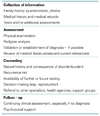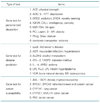Abstract
The successful completion of Human Genome Project (HGP) and further advances in genomic research and technology ushered a new era of genetic medicine in the 21st century. The discovery of a gene-disease association lays the groundwork for the development of a genetic test. Clinical applications of genetic information and tools have provided us with the ability to perform a wide range of DNA testing for the diagnosis of various genetic diseases in patients as well as predicting the disease and disease susceptibility among presymptomatic family members at risk. Thus, the introduction of a new genetic testing may have complex implications for patients, family members, and the society. Guidelines for genetic testing have been developed not only to insure the accuracy of testing with the analytical validity, clinical validity, and clinical utility itself, but also to provide an implicit guide to ethical, legal and social issues (ELSI). Non-directive genetic counseling prior to genetic testing can provide patients with clinical implications of testing in terms of its benefits as well as risks, and help the patient to prepare informed consent, while efforts are made to insure privacy and confidentiality of individual genetic information. Ensuring the appropriate use of genetic testing in Korean health delivery system requires multidisciplinary efforts for the development of practice guidelines and educational programs for clinical genetics professionals including genetic counselors as well as governmental regulatory implementation for ELSI of genetic testing.
Figures and Tables
References
2. American College of Medical Genetics. Standards and Guidelines for Clinical Genetics Laboratories. 2006. 4th ed.
3. Guidelines for Genetic Testing. Genetic-Medicine-Related Societies. 2003. (http://jshg.jp/e/index_e.htm).
5. McKusick VA. Medical genetics. A 40-year perspective on the evolution of a medical speciality from a basic science. JAMA. 1993. 270:2351–2356.

6. Rowland LP. The first decade of molecular genetics in Neurology: Changing clinical thought and practice. Ann Neurol. 1992. 32:207–214.

7. Bird TD, Bennette RL. Why do DNA testing? Practical and ethical implications of new neurogenetic tests. Ann Neurol. 1995. 38:141–146.

8. American Society of Clinical Oncology. Statement of the American Society of Clinical Oncology: Genetic Testing for Cancer Susceptibility. J Clin Oncol. 1996. 14:1730–1736.
9. Epstein CJ, Childs B. Ad Hoc committee on Genetic Counseling. Genetic Counseling. Am J Hum Genet. 1975. 27:240–242.
10. Nussbam RL, McInnes RR, editors. Thompson & Thompson Genetics in Medicine. 2001. 6th ed. Pennsylvania: Saunders;375–379.
11. Thomas DG, Fransis SC, et al. Principles of Medical Genetics. 1998. 2nd ed. Mayland: Williams & Wilkins;281–290.
13. American Society of Clinical Oncology Policy Statement Update; genetic testing for cancer susceptibility. J Clin Oncol. 2003. 21:2397–2406.




 PDF
PDF ePub
ePub Citation
Citation Print
Print






 XML Download
XML Download